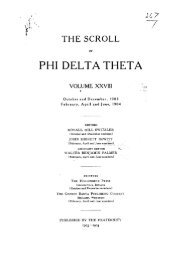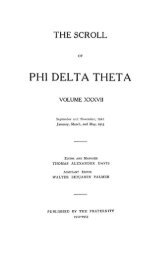1993 Volume 116 No 1–4 - Phi Delta Theta Scroll Archive
1993 Volume 116 No 1–4 - Phi Delta Theta Scroll Archive
1993 Volume 116 No 1–4 - Phi Delta Theta Scroll Archive
You also want an ePaper? Increase the reach of your titles
YUMPU automatically turns print PDFs into web optimized ePapers that Google loves.
system, and can't afford the drugs we are developing here," he<br />
says.<br />
In America, Volberding and others in the research community<br />
are working to advance drug treatments for people already<br />
infected with HIV. The goal is a treatment that would enable<br />
victims to Uve with the disease<br />
much Uke current sufferers of<br />
diabetes.<br />
But the United States, too,<br />
is experiencing an increasing<br />
HIV-positive population, and<br />
the demographics of the group<br />
are shifting. With increasing<br />
numbers of HIV infected minorities and women, AIDS has become<br />
less and less a disease affecting only gay men.<br />
As of March, <strong>1993</strong>, the Centers for Disease Control in Atlanta<br />
reported 182,275 deaths resulting from AIDS. In 1990 the<br />
second leading cause of death for men between 25 - 44 years old<br />
was AIDS. The CDC estimates that 1 miUion Americans are<br />
HIV-positive. These numbers indicate a massive patient population<br />
that must be cared for in the future, which is the reason<br />
Brother Volberding and others are ferventiy pursuing a curative<br />
drug treatment as weU as a vaccine for prevention.<br />
Education is currentiy the only weapon for AIDS prevention.<br />
Volberding does his part to address the stereotyping and suspicion<br />
that often foUows the disease, and he works to provide updated<br />
information about prevention to the urban community<br />
where AIDS has rapidly spread. Volberding often travels to hospitals<br />
and conferences giving lectures on AIDS, but he trys to be<br />
at his cUnic at least once a week.<br />
"I can be on the road these days up to 25 or 30 percent of the<br />
time," he says. "United AirUnes knows me by name. The real trap<br />
is that, as I've gotten more weU-known and involved in more<br />
committees, it gets harder and harder to be a primary physician."<br />
Volberding spends a lot of his time on the road advocating<br />
continued education about the disease. He also encourages college<br />
students, especiaUy Greeks, to become involved.<br />
"If there is a wiUingness to deal with AIDS not as a stigmatized<br />
issue but as something that affects us aU, and if fraternities<br />
are wUUng to lead in AIDS education, then I think they can play<br />
a very important role," he says.<br />
Volberding attended coUege during the turbulent years of the<br />
late '60s, and he remembers the stabiUty the Fratemity provided<br />
him.<br />
"I think you experience so many changes and you grow so<br />
fast during coUege that the supportive environment that the Fraternity<br />
offered was immensely helpful," he says. "The Fraternity<br />
plays a great role in giving people a sense of their own responsibUity."<br />
Personal responsibUity is a message he tries to send to coUege<br />
students, especiaUy regarding social behavior.<br />
I think most coUege students reaUy understand that they are<br />
not in a high-risk group. The problem is convincing them that<br />
they should stiU keep AIDS in mind and take precautions. Because<br />
of their age, abstinence probably won't be very popular, but<br />
they re educated enough that promoting condom use can have a<br />
Volberding believes that<br />
fraternities can and should<br />
take a leading role in<br />
campus AIDS education.<br />
substantial impact," he says.<br />
The largest factor putting coUege students at risk is the promiscuity<br />
of the age group. Volberding beUeves that fraternities<br />
can significantiy affect the campus community by modifying behavior<br />
and supporting AIDS organizations on campuses.<br />
"I think fraternities at many<br />
schools are leading social institutions<br />
that can model proper behavior,"<br />
he says. "And many fraternities,<br />
especiaUy <strong>Phi</strong> <strong>Delta</strong><strong>Theta</strong>,<br />
can actively sponsor community<br />
organizations that provide AIDSrelated<br />
service."<br />
At times, the rapid spread of HIV infection and the lack of<br />
any clear solution to the disease in the near fiiture leaves very<br />
Uttie hope for AIDS patients and physicians alike, but<br />
Volberding's upbeat attitude is difficult to shake.<br />
"If I weren't the world's biggest optimist, I would be working<br />
in a different area," he says. "You have to expect that sooner or<br />
later, we're going to stop this. But to this point, there is very Uttle<br />
evidence that anything we have done has had any impact at aU."<br />
With a possible cure and vaccine stiU years away, Volberding<br />
sometimes finds it difficult to convince the government and the<br />
pubUc that AIDS should continue to be a priority. The image of<br />
that first victim of AIDS-induced KS stiU haunts Volberding,<br />
motivating him despite the fhistration. •<br />
New discovery may lead to ALS cure<br />
Ever since Lou Gehrig's, Columbia '25,<br />
tragic death in 1941, a war has raged<br />
against amyotrophic lateral sclerosis (ALS),<br />
the disease that results in degeneration of<br />
the nervous system, paralysis, and eventual<br />
death. <strong>No</strong>w, recent identification of the<br />
gene that causes ALS may lead to a cure of<br />
the disease that affects 30,000 Americans.<br />
Already the discovery has led to an<br />
y ,aJJif#»j*J<br />
Lou Gehrig<br />
understanding of how the gene causes ALS,<br />
and researchers hope that continuing research<br />
will lead to cures for many other diseases.<br />
"After 120 years of research, it's probably the most exciting<br />
thing that has happened in ALS ever," says Lynn M. Klein, vice<br />
president of patient services for ALS Association in Woodland<br />
Hills, Calif.<br />
<strong>Phi</strong> <strong>Delta</strong><strong>Theta</strong> has been an active member in the fight<br />
against Lou Gehrig's disease. Brothers Andy Soffel, Pittsburgh '52,<br />
and Warner Peck, Wabash '69, are both members of ALS<br />
Association's board of trustees, and many chapters have adopted<br />
ALS as their philanthropy.<br />
"It is difficult to focus public attention on ALS when comparatively<br />
so few people suffer from it," Soffel says."If we could<br />
coordinate [<strong>Phi</strong> Delt] chapters on ALS, we could establish a network,<br />
especially for fund-raising, that would really help to bring<br />
attention to this disease."<br />
FaU <strong>1993</strong> 219

















